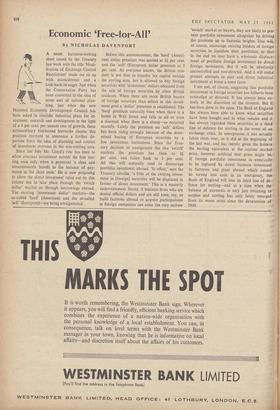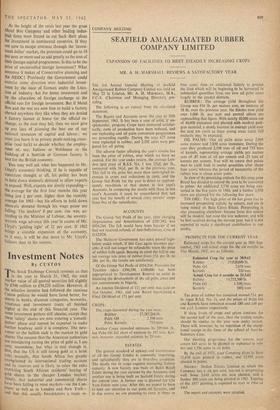Economic `Free-for-All'
By NICHOLAS DAVENPORT Since last July Mr. Lloyd's rule has been to allow overseas investment outside the free ster- ling area only when it promised 'a clear and commensurate benefit to the balance of pay- ments in the short term.' He is now proposing to allow the direct investment ruled out by this stricter test to take place through the 'switch dollar' market or through borrowings abroad. The existing 'investment dollar' markets—the so-called 'hard' (American) and the so-called 'soft' (European)—are being amalgamated. Before this announcement, the 'hard' (Ameri- can) dollar premium was quoted at 21 per cent. and the 'soft' (European) dollar premium at 5 per cent. As everyone knows, the British resi- dent is not free to transfer his capital outside the sterling area, but is allowed to buy foreign securities with 'investment' dollars obtained from the sale of foreign securities by other British residents. When there are more British buyers of foreign securities than sellers in this invest- ment pool a 'dollar' premium is established. The 'hard' premium naturally /rises when there is a boom in Wall Street and falls to nil or even a discount when there is a slump—as occurred recently. Lately the premium on 'soft' dollars has been rising strongly because of the deter- mined buying of European securities by a few investment institutions. Since the Trea- sury decision to amalgamate the two 'switch' markets the premium has risen to 41 per cent. and fallen back to 3 per cent. All this will naturally tend to discourage portfolio investment abroad. 'In effect,' says the Treasury circular, 'a little of the existing invest- ment in [foreign] securities will be displaced in favour of direct investment.' This is a masterly understatement. Surely, if business firms who are denied official dollars and are still keen, say, to build factories abroad or acquire participations in foreign companies can enter the very narrow `switch' market as buyers, they are likely to pre- vent portfolio investment altogether by driving the premium up to fantastic heights. This will, of course, encourage existing holders of foreign securities to liquidate their portfolios, so that in the end we may have a wholesale displace- ment of portfolio foreign investment by direct foreign investment. But it will be absolutely uncontrolled and non-directed. And it will make present attempts to plan and direct industrial investment at home a mere farce.
I am not, of course, suggesting that portfolio investment in foreign securities has hitherto been controlled or directed. It has always been en- tirely at the discretion of the investor. But it _has been done in the open. The Bank of England has always been able to know what securities have been bought and in what volume and it has always regarded these securities as a third line of defence for sterling in the event of an exchange crisis. In emergencies it has actually taken them over, as it did at the beginning of the last war, and has merely given the holders the sterling equivalent at the current market price, however artificial that price might be. if foreign portfolio investment is eventually to be replaced by direct business investment in factories and plant abroad which cannot be turned into cash in an emergency, the Bank of England will lose its third line of de- fence for sterling—and at a time when the balance of payments is only just returning to surplus and sterling has only lately emerged from its worst crisis since the devaluation of 1949. At the height of the crisis last year the great Metal Box Company and other leading indus- irial firms were forced to cut back their plans for investment in continental countries. If they are now to escape overseas through the 'invest- meat dollar' market, the premium could go to 10 Per cent. or more and so add greatly to the cost of their foreign capital programmes. Is this to be the price of uncontrolled foreign investment? What nonsense it makes of Conservative planning and the NEDC! Previously the Government could exercise some direction over industrial invest- ment by the issue of licences under the Loca- tion of Industry Act for home investment and by the allocation of foreign exchange at the official rate for foreign investment. But if Metal Box and the rest are now free to build a factory abroad anywhere they like when they are denied a factory licence at home (or the official ex- change, as the case may be), then we must give up any idea of planning the best use of our national resources of capital and labour: we must just leave it to private profit-making enter- prise (and luck) to decide whether the employ- Mont of, say, Italians or Welshmen or the building of a Scottish or German factory is best for the British economy.
You may well ask what has happened to Mr. Lloyd's economic thinking. If he is capable of consistent thought at all, his policy has been to hold down domestic demand to allow exports to expand. Well, exports are slowly expanding— the average for the first four months this year being just # per cent. higher than the monthly average for 1961_-but his efforts to hold down domestic demand through his wage pause are failing. The dockers° 8 per cent. rise was, ac- cording to the Minister of Labour, the seventy- seventh wage advance this year in excess of Mr. Lloyd's 'guiding light' of 21 per cent. If 1962 brings a sizeable expansion of the economy, as it may, it will be due more to Mr. Lloyd's failures than to his success.







































 Previous page
Previous page